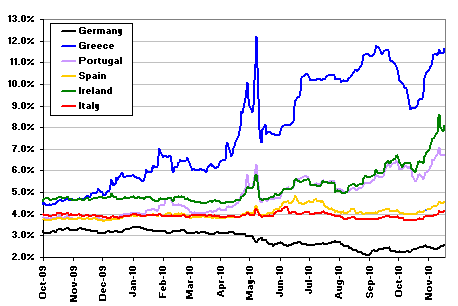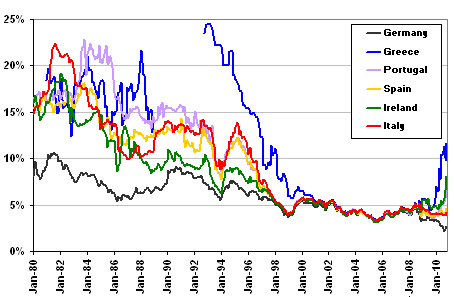Personal Wealth Management / Market Analysis
PIIGS Yields Up, Maybe Permanently
PIIGS yields are currently elevated on renewed sovereign debt fears, but proposed restructuring legislation could lead to permanently higher yields.
The recent uptick in Greek, Irish, and Portuguese yields (see Exhibit 1) can be partly attributed to budget season bringing more attention to deficit matters. And of course, there are the highly publicized individual national issues, including a likely Irish bailout. But if these countries (and investors) are protected from default by the €750 billion bailout, another country taking money doesn't by itself explain rising yields. Markets may be pricing in an additional risk—marking a permanent shift for peripheral eurozone sovereign debt.
Exhibit 1: PIIGS 10-Year Benchmark Sovereign Yields

Source: Thomson Reuters; as of 11/16/2010
Let's rewind to this past spring. The €750 billion bailout was a quick (and necessary) answer to Greek default risk heading into the weekend of May 8th – 9th. But it also directly contradicted an existing no-bailout clause in EU formation treaties. Save for the German constitutional court and a few others, the breaking of that clause was largely dismissed as a necessary evil to save the euro. Six months later the euro has a temporary three-year bailout and no long-term plan for future default risk.
The EU is preaching tighter fiscal surveillance, which is all well and good, but plans lack sufficient teeth in the German view. (Given German taxpayer fury over the first bailout, it's no surprise German policymakers don't want the next one to work the same way.) So Germany (accompanied by France) sought to strengthen fiscal resolve at a late-October EU summit. First, they proposed suspending EU voting rights for nations failing to follow a sustainable fiscal path. But they also proposed a more permanent crisis resolution mechanism be added to the Lisbon Treaty, where a country would be bailed out but private investors would share the cost.
Under the proposed mechanism, a failing nation would be bailed out, but private investors would take a haircut before taxpayers in wealthy eurozone countries are asked to contribute. Early reports frame it as a two-stage model: first, redemption payments coming due would be extended, and second, if the nation's fiscal position cannot return to a sustainable path, bondholders would have to accept a haircut in exchange for a guarantee of remaining debt. The amount of the haircut would directly affect prices, and thus yields—essentially, writing country risk into the Lisbon Treaty and causing PIIGS yields to rise well over German yields and stay there depending on each country's fiscal health.
Investors blanched when the plan first came to light. But officials have since communicated the proposal will not affect the current €750 billion bailout or any upcoming Irish rescue. And though the EU summit supported the proposal in principle, they're still a long way away from making it law because of all the steps required (consensus amongst European Finance Ministers, an EU parliament vote, etc).
Notable critics include the European Central Bank's Jean Claude Trichet, who worries restructuring risk would cause yields to rise in the weaker nations—and of course, he's right. If investors know they're going to be even partially on the hook for bailout costs, there's no chance they'll loan to weaker eurozone sovereigns at a rate anywhere near Germany's. But maybe better accounting for risk would positively realign borrowing and spending incentives in weaker countries. Common sense tells you Portugal, Ireland, Greece, and Spain shouldn't be borrowing at German rates. Even before the proposal there was a case for yields heading permanently higher. Pre-euro spreads were historically much bigger than they were from 2000-2008 (see Exhibit 2). And even six months after a €750 billion bazooka shot, yields have yet to meaningfully come down from spring highs.
Exhibit 2: PIIGS Historical 10-Year Benchmark Sovereign Yields

Source: Global Financial Data, Thomson Reuters; as of 11/16/2010
PIIGS leaders see the tight spreads relative to Germany from 2000-2008 as normal. Portuguese Prime Minister Jose Socrates continues to blame speculators for higher yields, while Greek policymakers naively construct plans to wade back into markets when yields return to 5% (equivalent to bailout interest rates)—an assumption which may never come to fruition. In reality, it's becoming clear the 2000-2008 period was abnormal—a dislocation stemming from the creation of the euro, when investors shunned country risk under the implicit assumption Germany would bail out a weak eurozone nation. But that implicit full backstop erodes in three years under the orderly restructuring proposal, which means regardless of the near-term resolution in Ireland that has captivated global attention, PIIGS leaders may want to brace themselves for a future with higher spreads than they currently envision.
If you would like to contact the editors responsible for this article, please message MarketMinder directly.
*The content contained in this article represents only the opinions and viewpoints of the Fisher Investments editorial staff.
Get a weekly roundup of our market insights
Sign up for our weekly e-mail newsletter.

You Imagine Your Future. We Help You Get There.
Are you ready to start your journey to a better financial future?

Where Might the Market Go Next?
Confidently tackle the market’s ups and downs with independent research and analysis that tells you where we think stocks are headed—and why.





